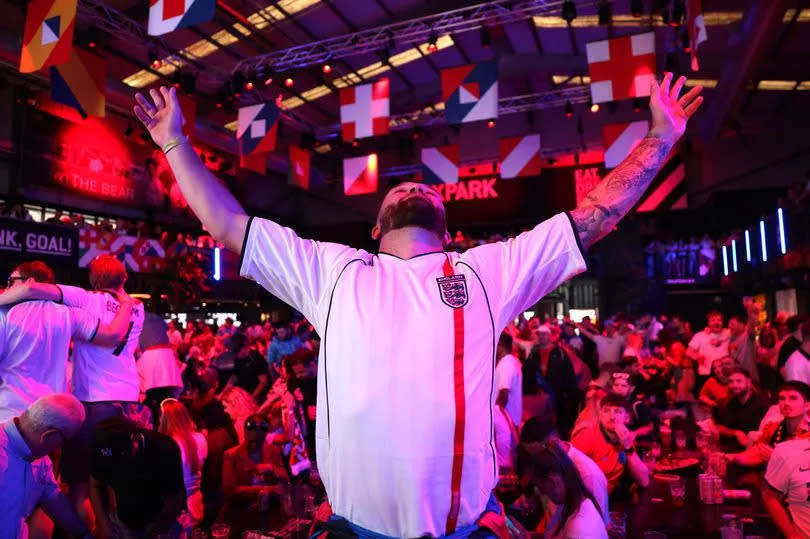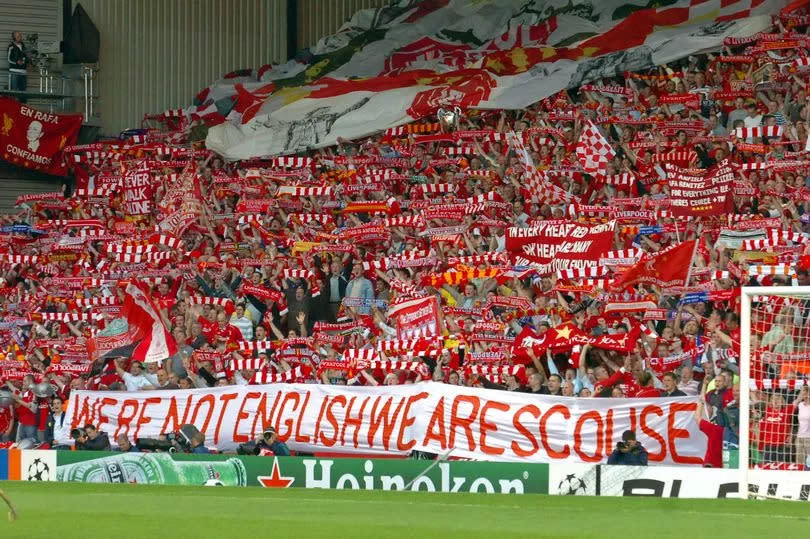Why many Scousers won't support England in the Euros

The Euros are in full flow and most of the country is behind England.
Fancied among the favourites before the tournament, Gareth Southgate's side have made a shaky start to their campaign in Germany. The performances have been far from great, but with a win and a draw, England are top of Group C with a match to play.
As England proceed through the championships, expect to see more scenes of pints flying into the air in celebration, fans singing the national anthem heartily and pubs decked out with the flag of St George across the nation. Less so in Liverpool, it has to be said.
READ MORE: 'It's like I've got 50 nans and grandads': Building a family in Ireland's 'second capital city'
READ MORE: Raunchy advert still making Scousers laugh 20 years on
This is not a city which feels particularly patriotic, even when it comes to football. Never more than when England are in a tournament, the mantra of 'Scouse, not English' is heard as justification for not getting behind the Three Lions.
That said, there are many Liverpudlians who support the national team - and there are certain pubs and venues like Boxpark in the Baltic Triangle which have gone all out for the Euros. But the England football team is met with apathy from plenty of Scousers - or even disdain in some corners.
Large swathes of this city feel they have nothing in common with the rest of the country. As such, Liverpool can feel like it is either its own separate entity or an Irish city in England.
It's evident beyond a lack of support for the national team. Liverpool's recent trips to Wembley have seen fans boo the national anthem, such is their dislike of the British establishment. A flag regularly spotted at Anfield reads ‘Scouse not English’ and that sentiment is felt keenly among many Evertonians as well.
There are many reasons for that. Maybe the most historic is the impact of Irish immigration into the city. Liverpool is often dubbed 'the second capital of Ireland' and you can't move far in this city without meeting someone with a connection to the Emerald Isle.
It's undeniable that Scouse culture is imbued with a strong Irish influence. It is often thought that Ireland's historic connection with Liverpool coincided with the Great Famine, which occurred between 1847 and 1851. It resulted in an enormous number of Irish people settling in Liverpool, having left their homeland, but there was actually already a well established Irish community in the city before the famine.
The 19th century saw the constituency Liverpool Scotland, which was centred on Scotland Road and had a very large Irish population, elect an MP from the Irish Nationalist party. Thomas Power O'Connor served Liverpool Scotland from 1885 to 1929.
Jon Tonge is a Professor of British and Irish Politics at the University of Liverpool. He spoke to the ECHO in 2021 about the effect that 19th century migration from Ireland had on Liverpool's identity.
Professor Tonge believes Liverpool is now "very, very proud" of its links with Ireland, adding that the "sense of the Irish rebel" has become part of the Scouser's identity.
He said: "Some people would see it as a chippiness, but I see it as an anti-authoritarianism and rebelliousness.
"It's pretty sceptical, it's sceptical of most people in power or authority and that extends to a lack of interest in support for the monarchy, through to contempt for governments. It did take Liverpool a long time to become a Labour city because of those divisions between Protestant and Catholic Irish within the same city.
"Whereas once upon a time Irishness was controversial in the city, now it's a much-loved feature and it fed into that modern day culture of Scouseness, which is very distinctive."
The city's large Irish community and position on England's west coast, looking out across the Irish Sea, means that it often doesn't feel very English at all. There are many people in the city who feel more Irish than English and it is no shock that they harbour no love for the England football team.
More recently, the city of Liverpool's relationship with the rest of England has been tested during long periods of Conservative rule.

The 1980s were tough for Liverpool. The city faced wide-scale poverty and unemployment. There was a feeling that it was left to suffer alone while Margaret Thatcher was Prime Minister.
After the Toxteth Riots of 1981, Thatcher's Chancellor Geoffrey Howe urged the Prime Minister to abandon Liverpool and place the city through "managed decline". He wrote to the Prime Minister, telling her "not to over commit scarce resources to Liverpool".
Howe wrote: "We do not want to find ourselves concentrating all the limited cash that may have to be made available into Liverpool and having nothing left for possibly more promising areas such as the West Midlands or, even, the North East.
"It would be even more regrettable if some of the brighter ideas for renewing economic activity were to be sown only on relatively stony ground on the banks of the Mersey. I cannot help feeling that the option of managed decline is one which we should not forget altogether. We must not expend all our limited resources in trying to make water flow uphill."
Though the suggestion was not adopted - Michael Heseltine argued in favour of ambitious regeneration plans - Liverpool feels let down by government as a result.
It is something which has been seen again in the stark impacts of the austerity agenda of the past 14 years of Tory government. Liverpool has faced brutal cuts from central government, worsening the lives of so many people in this city. As such, there is a sentiment that if England does not care about Liverpool, why should Liverpool care about England?
The reaction to the Hillsborough Disaster in 1989 encapsulates that feeling. The unlawful killing of 97 Liverpool fans at the 1989 FA Cup semi-final at Hillsborough was followed by those very fans being besmirched by a national newspaper, while a police cover up tried to hide the truth for decades.
Many across Liverpool felt the establishment had rallied against the city once again.
After 23 years of waiting, the 2012 Hillsborough Independent Panel review exonerated fans of all blame and instead found evidence of an extensive cover-up by police to smear the reputation of fans. It found the police had made "substantive amendments" to statements that showed criticism of police management and the response to the unfolding disaster. Documents showed senior officers had discussed the "animalistic behaviour of drunken marauding fans".
The report also blamed Sheffield-based White's News Agency for being the originators of the false press reports including The S*n's shameful front page. White's reporting was based on briefings from four South Yorkshire Police officers.
The Hillsborough inquests, which took place four years after the panel report, found by majority verdict that the Liverpool fans were unlawfully killed, due to gross negligence from police and ambulance services. Those fans were failed by the police, before lies were spread about them by a newspaper that remains among the country's best selling.
To this day, Liverpool fans face chants mocking the events at Hillsborough from some football supporters. As a result, many football fans in the city don't much feel like supporting England after such treatment from those who should be their fellow supporters.
In response to a number of historical factors, there is a rebellious, outward-looking streak in Liverpool. Many people believe it doesn't feel very English at all.
As such, you won't hear the national anthem sung in many pubs here during the Euros and don't expect to see a pint of lager hurled in the air when a goal goes in. Frankly, when it comes to supporting England, many in this city are quite happy to walk alone.
The Liverpool Daily Post newsletter delves into the biggest stories on Merseyside
Win a £25 Just Eat gift card in our amazing Euro 2024 prize giveaway

 Yahoo News
Yahoo News 
